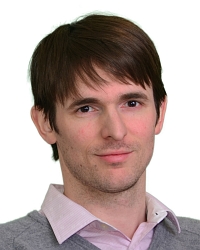TR2019-013
SDR -- Half-Baked or Well Done?
-
- , "SDR -- Half-Baked or Well Done?", IEEE International Conference on Acoustics, Speech, and Signal Processing (ICASSP), DOI: 10.1109/ICASSP.2019.8683855, May 2019.BibTeX TR2019-013 PDF
- @inproceedings{LeRoux2019may,
- author = {{Le Roux}, Jonathan and Wisdom, Scott and Erdogan, Hakan and Hershey, John},
- title = {{SDR-- Half- Baked or Well Done? }},
- booktitle = {IEEE International Conference on Acoustics, Speech, and Signal Processing (ICASSP)},
- year = 2019,
- month = may,
- doi = {10.1109/ICASSP.2019.8683855},
- url = {https://www.merl.com/publications/TR2019-013}
- }
- , "SDR -- Half-Baked or Well Done?", IEEE International Conference on Acoustics, Speech, and Signal Processing (ICASSP), DOI: 10.1109/ICASSP.2019.8683855, May 2019.
-
MERL Contact:
-
Research Area:
Abstract:
In speech enhancement and source separation, signal-to-noise ratio is a ubiquitous objective measure of denoising/separation quality. A decade ago, the BSS eval toolkit was developed to give researchers worldwide a way to evaluate the quality of their algorithms in a simple, fair, and hopefully insightful way: it attempted to account for channel variations, and to not only evaluate the total distortion in the estimated signal but also split it in terms of various factors such as remaining interference, newly added artifacts, and channel errors. In recent years, hundreds of papers have been relying on this toolkit to evaluate their proposed methods and compare them to previous works, often arguing that differences on the order of 0.1 dB proved the effectiveness of a method over others. We argue here that the signal-to-distortion ratio (SDR) implemented in the BSS eval toolkit has generally been improperly used and abused, especially in the case of single-channel separation, resulting in misleading results. We propose to use a slightly modified definition, resulting in a simpler, more robust measure, called scale-invariant SDR (SI-SDR). We present various examples of critical failure of the original SDR that SI-SDR overcomes.
Related News & Events
-
NEWS MERL presenting 16 papers at ICASSP 2019 Date: May 12, 2019 - May 17, 2019
Where: Brighton, UK
MERL Contacts: Petros T. Boufounos; Anoop Cherian; Chiori Hori; Toshiaki Koike-Akino; Jonathan Le Roux; Dehong Liu; Hassan Mansour; Tim K. Marks; Philip V. Orlik; Anthony Vetro; Pu (Perry) Wang; Gordon Wichern
Research Areas: Computational Sensing, Computer Vision, Machine Learning, Signal Processing, Speech & AudioBrief- MERL researchers will be presenting 16 papers at the IEEE International Conference on Acoustics, Speech & Signal Processing (ICASSP), which is being held in Brighton, UK from May 12-17, 2019. Topics to be presented include recent advances in speech recognition, audio processing, scene understanding, computational sensing, and parameter estimation. MERL is also a sponsor of the conference and will be participating in the student career luncheon; please join us at the lunch to learn about our internship program and career opportunities.
ICASSP is the flagship conference of the IEEE Signal Processing Society, and the world's largest and most comprehensive technical conference focused on the research advances and latest technological development in signal and information processing. The event attracts more than 2000 participants each year.
- MERL researchers will be presenting 16 papers at the IEEE International Conference on Acoustics, Speech & Signal Processing (ICASSP), which is being held in Brighton, UK from May 12-17, 2019. Topics to be presented include recent advances in speech recognition, audio processing, scene understanding, computational sensing, and parameter estimation. MERL is also a sponsor of the conference and will be participating in the student career luncheon; please join us at the lunch to learn about our internship program and career opportunities.
